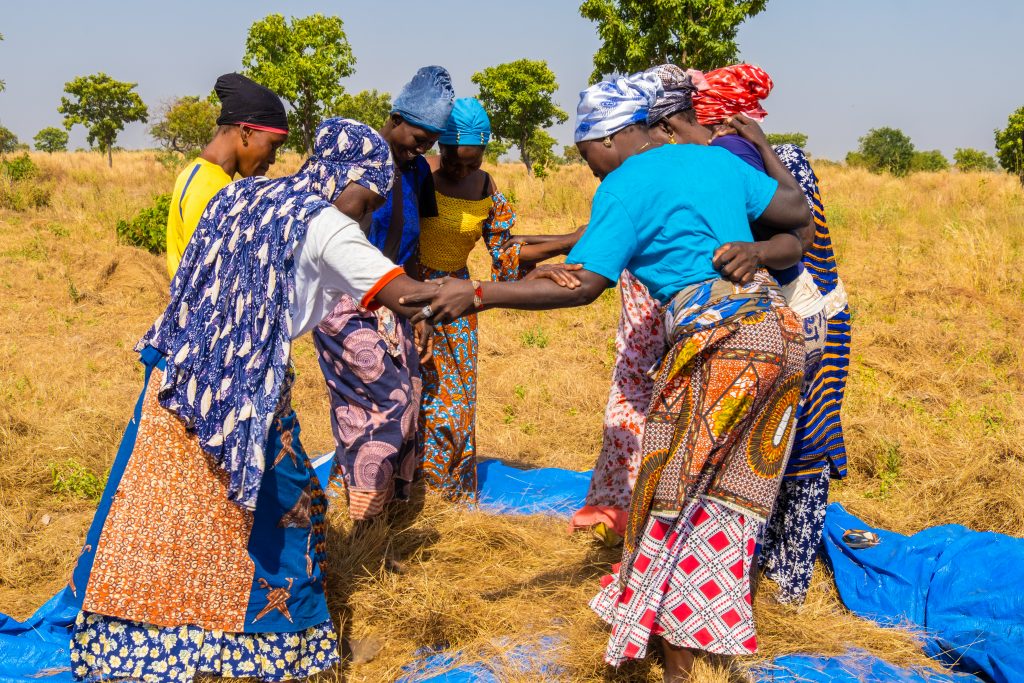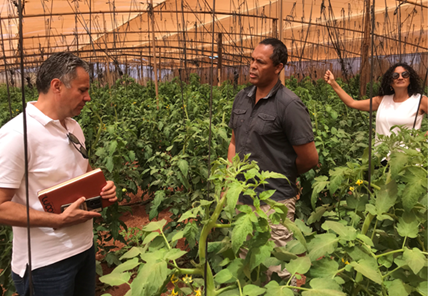Climate predictability is crucial to agricultural productivity around the world—a fact that is certainly confirmed in the agricultural sector in West Africa. Consequently, agriculture, especially through large-scale farming enterprises, is deemed a risky financial investment, leaving the industry in West Africa to be primarily driven by smallholder farmers working on one to two acres of land using conventional, often rudimentary, farming methods. Agriculture is largely dependent on rainfall, and the effects of climate change that plague many parts of the region—droughts, disruptions in rainfall patterns, flooding, etc.—hamper these farmers’ abilities to reap the yields they had in previous years.
In efforts to mitigate these effects, farmers are often encouraged to adopt the approach of industrial monocropping, characterized by the use of imported seeds, and copious amounts of fertilizer and pesticide. The result is a vicious cycle where the collateral impacts of these farming methods—the loss of biodiversity, water contamination, greenhouse gas emissions from mechanization, and the release of natural carbon from tillage—contribute to environmental degradation and escalate climate change events.
At the USAID-funded West Africa Trade & Investment Hub (Trade Hub), we seek to address these challenges by supporting agricultural initiatives with sustainability and minimal environmental impact at the forefront. In particular, we support climate-smart activities, such as regenerative and greenhouse farming, to combat the impact of climate change on the deterioration of arable land and agricultural productivity, ensuring long-term, sustainable strides toward a food-secure West Africa.
In the Northern Region of Ghana, where weather conditions are harsh for agricultural production and climate events have accelerated desertification, the Trade Hub partners with AMAATI Company Limited (AMAATI), an agribusiness in Ghana engaged in the cultivation, processing, and export of fonio, to regenerate degraded land. Fonio, a West African heritage crop popular in the arid Sahel Belt, is a drought-resistant grain that has been cultivated in the region for more than 5,000 years.

AMAATI’s network of women farmers cultivate fonio on plots of degraded land in Chereponi, the North East region of Ghana. Photo Credit: Trade Hub
Millets such as fonio are particularly well-suited to meet food security needs in a sustainable manner. Fonio requires minimal irrigation—it thrives in arid conditions and requires about 80 percent less water for production than rice or wheat. The grain can also grow without substantial soil manipulation by way of tilling or ploughing. Additionally, it is beneficial for soil preservation and the regeneration of degraded land as its deep root systems allow for symbiotic relationships with fungi, providing increased water and nutrient absorption into the soil. As fonio decomposes slowly, it helps in maintaining soil structure and protecting topsoil from erosion. Because of these properties, fonio can even be grown in a crop rotation cycle alongside other crops to replenish lost nutrients.
“[With the Trade Hub grant,] AMAATI will leverage fonio to regenerate and monetize degraded land. Over 1,000 acres of land to be cultivated under this project are degraded and will be regenerated under positive land management measures,” asserts Salma Abdulai, CEO and Co-Founder of AMAATI. “This will positively impact the environment and help reduce climate change impacts that cause desertification.” AMAATI has to date successfully cultivated 600 acres of degraded land, with Fonio planting ongoing.
Recognizing the value and potential of Fonio, the Trade Hub has also partnered with agribusinesses in Mali that work in the Fonio value chain. Mali Shi and Yolélé have begun a Fonio pilot project with 45 farmers, with plans to scale up to 6,000 farmers by mid-2024, to train farmers on new cultivating and harvesting techniques. The project will result in Mali Shi and Yolélé producing 4,800 tons of Fonio annually, providing not only a substantial economic boost for farmers in these Malian communities but also doing so with a crop that protects their limited arable land.
Nearly 2,000 miles west, in the archipelago of Cabo Verde, the image of agriculture is shifting. In place of acres of sun-scorched crops, planted in carefully designated lanes reminiscent of the aisles of a local supermarket, farmers are saving on soil exploitation, irrigation, and pesticides by growing vertically, using hydroponic green-housing systems. Agrosoluções, a Trade Hub partner in the agriculture industry in Cabo Verde, is an agribusiness engaged in the production of fruits and vegetables, implementing greenhouses and other technologies to build more sustainable agricultural systems.

Agrosoluções employs greenhouses in the cultivation of vegetables to produce crops of higher quality and uniformity, and minimize environmental impact. Photo Credit: Trade Hub
Agrosoluções is not only dedicated to the use of greenhouses for production but has also significantly reduced its greenhouse gas emissions by establishing a water desalination system to treat and use salt water and a photovoltaic system to utilize solar energy for production.
With limited arable land and a climate that is unfriendly to agriculture, Cabo Verde foreshadows what could be the fate of other West African countries in the aftermath of a climate crisis. The application of greenhouses to mitigate the impact of agriculture on the environment and provide resilience in circumstances where climate events have adversely affected the productivity of conventional farming methods holds promise.
Conventional farming is unpredictable– fields are vulnerable to weather, pests, and water access. With greenhouses, farmers can predetermine factors such as temperature and light exposure and use significantly less water for crop cultivation. “The preference for this technology is explained by the limited negative impact on the environment…the use of pesticides is greatly reduced, the need for water is reduced by 50 percent while production by square meter increases, and crops become more uniform with higher quality,” explains Adilson Cesar Fortes Dias Melicio, Project Manager of the Trade Hub partnership with Agrosoluções.
Through the Trade Hub’s partnerships addressing food security in West Africa, we seek to build agricultural systems that are resilient at every stage (from seed production to the point of sale), provide farmers with dignified livelihoods, and encourage technologies that sustain these achievements. Climate-smart initiatives are integral to this process to ensure that our partners are equipped to achieve optimal levels of productivity while making the necessary adaptations to their methods to minimize environmental impact.

